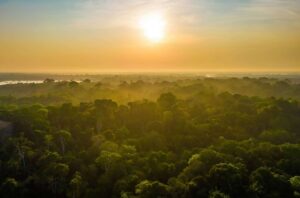The increase in temperature global average It’s too close of Overcome the 1.5 ° C mark. This was the limit established by Agreement Parissigned by dozens of countries for ten years. This is what a new study published in the magazine points out Earth System Science Data (ESSD).
Research works with a concept called “budget of carbon“. That is, the limit of gases of greenhouse that can be issued to maintain probability of 50% not to pass the brand of 1.5 ° C of heating in relation to pre-industrial levels.
Worldwide scenario before climate change
Leaving the theory and going to the numbers, we have the following scenario:
- The intergovernmental panel on UN climate change estimated, in 2021that the remaining carbon budget for the goal was 500 billion tons of CO₂. The new study points out that this number fell to 130 billion tons in 2024;
- In the evaluation of Joeri Rogelj, professor of climate science and policy at Imperial College London (England) and co -author of research conducted by more than 60 international scientiststhe goal looks increasingly unreachable;
- The team came to the conclusion that both the level and the pace of global warming in 2024 were unpublished.
Climatologist warns of the climate future of the planet
THE Digital Look talked to the climatologist Carlos NobreFull Professor of the Chair of Climate and Sustainability at São Paulo University (USP) and co -president of the Scientific Panel for the Amazon. He stressed that The time to act is running out.
“The future risk is what science is indicating now. The world meteorological organization [OMM] also launched a very important report, saying that the probability that we permanently reach 1.5 ° C before 2030 very high if we continue with emissions of greenhouse gases, ”he explained.
“[O estudo] It is indicating that the maximum we can issue to be below 1.5 ° C would be in the order of 130 billion tons of greenhouse gases. [Hoje] We are issuing More than 50 billion per year. Then, In three years, we would already spend this limit. ”
“As I said, science is trying to explain a lot how we increased the temperature, from 0.35 ° C, from 2022 to 2024. El Niño disappeared in April, but The temperature remains very hot, hit the record in most oceans and therefore this is a gigantic risk“He stressed noble.
Read more:
The article evaluated ten Climate change indicators and was released during the UN climate negotiation meeting in Bonn (Germany).
The researchers estimate that the average global temperature in the decade that ended in 2024 was 1.24 ° C above pre-industrial levels-mainly because of the logging and from fossil fuel burning. To get an idea, the global warming rate of 2012 to 2024 it was the double registered in the decades of 1970 and 1980.
This is a scenario that, if not reverted, will lead to a irreparable loss In different biomes, according to Carlos Nobre. “But if we reach 1.5 ° C until 2030 and continue with emissions, even slowly reducing emissions to 2050us, Certainly, we would pass 2 ° C and We can reach up to 2.5 degrees in 2050. This is an ecocide, a suicide for the planet“He warned.
“The Amazon will disappear”, alerts noble
In order, the climatologist listed the big problems by which the planet (and us) we can face if the situation is not reversed:
The frozen soil of Siberia, northern Canada, northern Alaska and Permafrost, up to 2100, from 2 ° C, will play more than 200 billion tons of greenhouse gas, especially methane, which much more absorbs infrared radiation than carbon dioxide.
We will lose the Amazon. We may lose up to 70% of the Amazon, self -designer to an open, highly degraded open ocean system, a super degraded savannah. We will play over 250 billion tons of carbon dioxide [na atmosfera] Until 2100.
We will accelerate the melting of Greenland’s ice mantle and the sea level will rise much faster than part of Antarctica. We will extinguish practically until 2100. We may lose more than 99% of coral reef species, where it maintains 25% of biodiversity. And we will also neat a lot of the ocean, the sea of ice of the Arctic and near Antarctica.
These are gigantic risks that we are living. COP 30 has to be the most important of the 30 COPs. We have to combat all climate emergency, otherwise the planet goes to ecocide.
Carlos Nobre, Full Professor of the Climate and Sustainability Chair of São Paulo University (USP) and co -president of the scientific panel for the Amazon, in an interview with Digital Look











